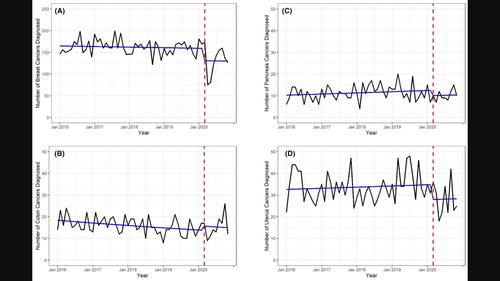当前位置:
X-MOL 学术
›
Cancer Med.
›
论文详情
Our official English website, www.x-mol.net, welcomes your feedback! (Note: you will need to create a separate account there.)
Trends in breast, colon, pancreatic, and uterine cancers in women during the COVID‐19 pandemic in North Carolina
Cancer Medicine ( IF 4 ) Pub Date : 2024-04-04 , DOI: 10.1002/cam4.7156 Sarah J. Nyante 1, 2 , Allison M. Deal 2 , Hillary M. Heiling 2 , Kyung Su Kim 2 , Cherie M. Kuzmiak 1 , Benjamin C. Calhoun 2, 3 , Emily M. Ray 2, 4
Cancer Medicine ( IF 4 ) Pub Date : 2024-04-04 , DOI: 10.1002/cam4.7156 Sarah J. Nyante 1, 2 , Allison M. Deal 2 , Hillary M. Heiling 2 , Kyung Su Kim 2 , Cherie M. Kuzmiak 1 , Benjamin C. Calhoun 2, 3 , Emily M. Ray 2, 4
Affiliation

|
ImportanceThe COVID‐19 pandemic led to reductions in primary care and cancer screening visits, which may delay detection of some cancers. The impact on incidence has not been fully quantified. We examined change in cancer incidence to determine how the COVID‐19 pandemic may have altered the characteristics of cancers diagnosed among women.MethodsThis study included female patients aged ≥18 years and diagnosed with breast (n = 9489), colon (n = 958), pancreatic (n = 669), or uterine (n = 1991) cancer at three hospitals in North Carolina. Using interrupted time series, we compared incidence of cancers diagnosed between March 2020 and November 2020 (during pandemic) with cancers diagnosed between January 2016 and February 2020 (pre‐pandemic).ResultsDuring the pandemic, incidence of breast and uterine cancers was significantly lower than expected compared to pre‐pandemic (breast—18%, p = 0.03; uterine −20%, p = 0.05). Proportions of advanced pathologic stage and hormone receptor‐negative breast cancers, and advanced clinical stage and large size uterine cancers were more prevalent during the pandemic. No significant changes in incidence were detected for pancreatic (−20%, p = 0.08) or colon (+14%, p = 0.30) cancers.Conclusion and RelevanceIn women, the COVID‐19 pandemic resulted in a significant reduction in the incidence of breast and uterine cancers, but not colon or pancreatic cancers. A change in the proportion of poor prognosis breast and uterine cancers suggests that some cancers that otherwise would have been diagnosed at an earlier stage will be detected in later years. Continued analysis of long‐term trends is needed to understand the full impact of the pandemic on cancer incidence and outcomes.
中文翻译:

北卡罗来纳州 COVID-19 大流行期间女性乳腺癌、结肠癌、胰腺癌和子宫癌的趋势
重要性COVID-19 大流行导致初级保健和癌症筛查就诊次数减少,这可能会延迟某些癌症的检测。对发病率的影响尚未完全量化。我们检查了癌症发病率的变化,以确定 COVID-19 大流行如何改变了女性中诊断出的癌症的特征。方法本研究包括年龄≥18 岁并被诊断为乳腺癌的女性患者(n = 9489), 冒号 (n = 958),胰腺(n = 669),或子宫(n = 1991) 北卡罗来纳州三家医院的癌症。使用间断时间序列,我们将 2020 年 3 月至 2020 年 11 月(大流行期间)诊断的癌症发病率与 2016 年 1 月至 2020 年 2 月(大流行前)诊断的癌症发病率进行了比较。结果在大流行期间,乳腺癌和子宫癌的发病率显着低于与大流行前相比预计(乳腺癌——18%,p = 0.03;子宫−20%,p = 0.05)。在大流行期间,晚期病理阶段和激素受体阴性乳腺癌以及晚期临床阶段和大尺寸子宫癌的比例更为普遍。未检测到胰腺发病率的显着变化(−20%,p = 0.08) 或冒号 (+14%,p = 0.30) 癌症。 结论和相关性 在女性中,COVID-19 大流行导致乳腺癌和子宫癌的发病率显着降低,但结肠癌或胰腺癌的发病率没有显着降低。预后不良的乳腺癌和子宫癌比例的变化表明,一些本来可以在早期阶段诊断出来的癌症将在晚年被发现。需要持续分析长期趋势,以了解大流行对癌症发病率和结果的全面影响。
更新日期:2024-04-04
中文翻译:

北卡罗来纳州 COVID-19 大流行期间女性乳腺癌、结肠癌、胰腺癌和子宫癌的趋势
重要性COVID-19 大流行导致初级保健和癌症筛查就诊次数减少,这可能会延迟某些癌症的检测。对发病率的影响尚未完全量化。我们检查了癌症发病率的变化,以确定 COVID-19 大流行如何改变了女性中诊断出的癌症的特征。方法本研究包括年龄≥18 岁并被诊断为乳腺癌的女性患者(



























 京公网安备 11010802027423号
京公网安备 11010802027423号